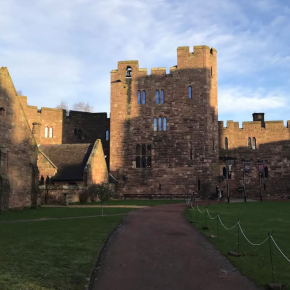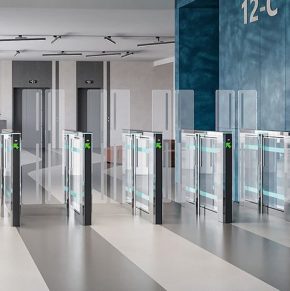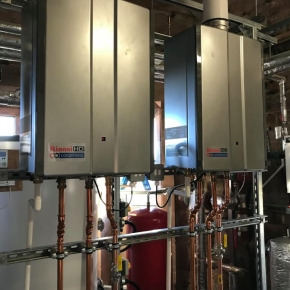
Rinnai panels for Peckforton Castle
Rinnai has recently carried out an installation at Peckforton Castle in Cheshire, replacing its old direct fired stored hot water system.
Two HDC 1500i units from the UK’s leading manufacturer of continuous flow hot water heating units and systems were linked to solar panels as the main hot water heating source by contractor A P Mitchell.
Peckforton Castle, built in 1842 and completed in 1851, is a Victorian country house built in the style of a medieval castle and is recorded in the National Heritage List for England as a Grade I listed building.
In 2006, the historic building was repurposed as a popular luxury hotel and spa.
Adam Mitchell, for A P Mitchell, commented: “The brief from the client was to create a more efficient system, and at the same time to enact a reduction in stored water volume to give substantial saving in gas fuel consumption.
“But the new system had to still meet peak demand in the hotel, spa and event facilities.
“Our company provides a professional and comprehensive M&E building service, design, supply and installation; offering quality construction workmanship and value for money services.
“We pride ourselves on our quality of building services, workmanship excellence and client service.”
Rinnai’s HDC1500i is an award-winning range of continuous flow water heating units. The range was developed to guarantee the maximum amount of affordable, ecologically friendly, safe-temperature controlled hot water, on demand at any time, by even the busiest commercial user.
The Rinnai 1500i is engineered to the highest standard and is technologically advanced, with a plethora of features giving extra value.
A huge bonus onsite has been the savings on fuel over other forms of water heating solutions, which has been achieved by the added advantage that Rinnai systems will only raise the temperature of the water if required and that these smart condensing water heaters will only increase the temperature by the precise amount needed.
This ensures any solar gains are maximised and ‘boosted’ by a secondary heat source, thus ensuring the optimisation of both technologies.
A Rinnai unit used as a gas booster for solar systems will not only maximise solar gain, it will only use the correct amount of energy for the demand at the time and the rest of the time the unit remains inactive.
It is this, the booster, that ensures never-ending hot water, no matter the demand or conditions. Fossil fuel is only used when the renewable thermal energy store is below its set-point, thus reducing the dependency on fossil fuel and reducing CO2 emissions.
The Rinnai system produces usable hot water on demand, at the turn of a tap or the push of a shower button. The relatively compact footprint of the units also means they can be housed in tight spaces and still be easily accessible for maintenance and servicing.
Latest news

15th April 2025
West Fraser: CaberDek earns top marks from Home Counties carpentry specialist
A specialist carpentry sub-contractor covering housing sites across a large swathe of the Home Counties has come to value CaberDek from the West Fraser range for a variety of reasons: not least because the high quality panel product doesn’t destroy his operatives’ electric saws!
Posted in Articles, Building Industry News, Building Products & Structures, Building Systems, Case Studies, Restoration & Refurbishment, Retrofit & Renovation, Roofs, Timber Buildings and Timber Products, Wooden products
15th April 2025
GEZE: The Role of Access Control Systems in Enhancing Building Safety
Jane Elvins, Specification and Business Development Manager at GEZE UK, delves into the role of access control systems in enhancing building safety…
Posted in Access Control & Door Entry Systems, Architectural Ironmongery, Articles, Building Industry News, Building Products & Structures, Building Services, Doors, Facility Management & Building Services, Health & Safety, Restoration & Refurbishment, Retrofit & Renovation, Security and Fire Protection
11th April 2025
Don’t Do a Dave! It’s Time to Lock FIT Show 2025 in Your Calendar!
It’s that time again – FIT Show is back! You could be forgiven for thinking there won’t be much new to see when FIT Show returns to the NEC from 29 April – 1 May. Wrong!
Posted in Articles, Building Industry Events, Building Industry News, Building Products & Structures, Building Services, Continuing Professional Development (CPD's), Exhibitions and Conferences, Information Technology, Innovations & New Products, Restoration & Refurbishment, Retrofit & Renovation, Seminars, Training
11th April 2025
Insight Data: Boost construction success with project and prospect data
For those working in construction – in whatever capacity – the last few years haven’t been much fun. And according to the latest statistics, it would seem the challenges are continuing – Alex Tremlett, Insight Data’s Commercial Director, has more…
Posted in Articles, Building Industry News, Building Services, Information Technology, news, Research & Materials Testing
 Sign up:
Sign up: 